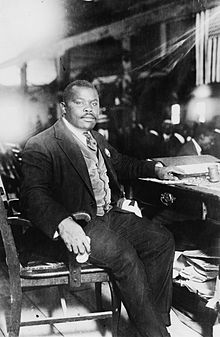African Memoirs
The Civil Rights Movement
Marcus Garvey is regarded as the leader of the largest organized mass movement in black history and the progenitor of the modern Black Is Beautiful revival that reached its apogee in the 1960s and 1970s in the United States. Hailed by his followers in the 1920s as a kind of political redeemer and dubbed “the Negro Moses,” Garvey has continued to fascinate writers and commentators as well as scholars and researchers.
While African resistance to European colonialism is often thought of in terms of a white and black/European and African power struggle, this presumption underestimates the complex and strategic thinking that Africans commonly employed to address the challenges of European colonial rule. It also neglects the colonial-era power dynamic of which African societies and institutions were essential components.
From the end of the nineteenth century and throughout the twentieth century black activists across the Atlantic world showcased their transnational political savoir faire, demonstrating how African-descended peoples profited from thinking and acting globally. For example, African Americans, especially scholars, entertainers, athletes, soldiers, and missionaries, traveled extensively, embracing new ideas, new strategies, and new solutions that they then applied back in the United States. As an illustration, Paul Robeson told reporters that his time in fascist Spain during the 1930s made all the more urgent his civil rights work in the United States.
Africa and Colonization
By the end of the 19th century, Africans and peoples of African descent—except Ethiopians, Haitians, and Liberians—were living under some form of European colonial domination. The history of Africa and its Diaspora was dismissed as insignificant at best, inexistent at worse. Black cultures were ridiculed, stereotyped, and scorned.
The Creation of Liberia
Was The Amalgamation Of Northern And Southern Nigeria In 1914 a mistake? (2)
Another crucial point against the amalgamation is the extremely selfish, myopic and immoral reasons British imperialists carried out the exercise. Clearly, the intention or purpose for creating something largely determines the use(s) to which it would be put and the moral weight or importance to be attached to it.
Was The Amalgamation Of Northern And Southern Nigeria In 1914 a mistake? (1)
To fully answer the question that forms the title of our discussion today, it is important to pose a subsidiary question: a mistake for whom or from whose perspective? Now, going by the saying that “One man’s meat is another man’s poison,” it is evident that different answers would be given to the main question by a typical British colonial official; members of the ruling northern establishment; a prominent Yoruba politician who feels that in 2023 he might be chosen by his party to contest for the post of President; an Igbo who believes strongly that his people do not have a sense of belonging in Nigeria; and so on. In other words, because the subsidiary question will elicit different responses from different categories of people, the leading question requires a nuanced answer.
The Corrupting Influences of the West
One of
the stated assumptions of colonial administration was that elites would emerge
from among African peoples to provide leadership in the effort to create
independent states. These people would combine African and European
knowledge in their leadership roles. Before reading this excerpt, think
of earlier statements you have read. How did Nigerian leaders see
themselves on the eve of independence? How did the writers of the 1945
Declaration to the United Nations and the 1921 London Manifesto portray
themselves? What does this author, writing in the World War II era, think
of the people who had "European" knowledge and worked with the
British in the colonial era?

One of the stated assumptions of colonial administration was that elites would emerge from among African peoples to provide leadership in the effort to create independent states. These people would combine African and European knowledge in their leadership roles. Before reading this excerpt, think of earlier statements you have read. How did Nigerian leaders see themselves on the eve of independence? How did the writers of the 1945 Declaration to the United Nations and the 1921 London Manifesto portray themselves? What does this author, writing in the World War II era, think of the people who had "European" knowledge and worked with the British in the colonial era?
THE BRISTOL HOTEL, LAGOS INCIDENT 1948 The rename of Some Colonial Masters Hospitals, Guest Houses
In 1948, Mr. Ivor Cummings, a distinguished African-Caribbean national and a top official of the Colonial Office in London was scheduled to pay an official visit to Nigeria. Naturally, his first port of call was Lagos, then our capital. Accommodation was reserved for him at the Bristol Hotel, Martin Street, Lagos, then owned and managed by expatriates.


Comments
Post a Comment